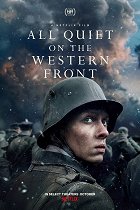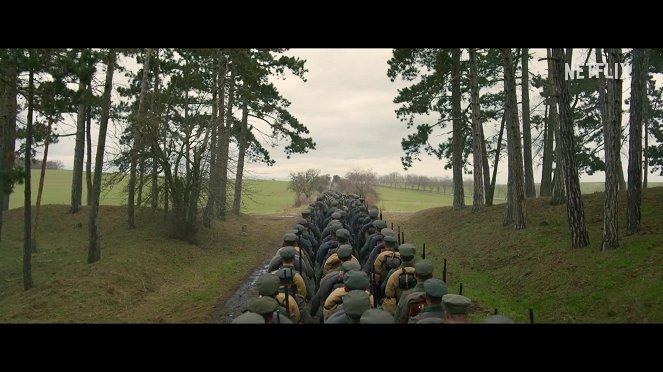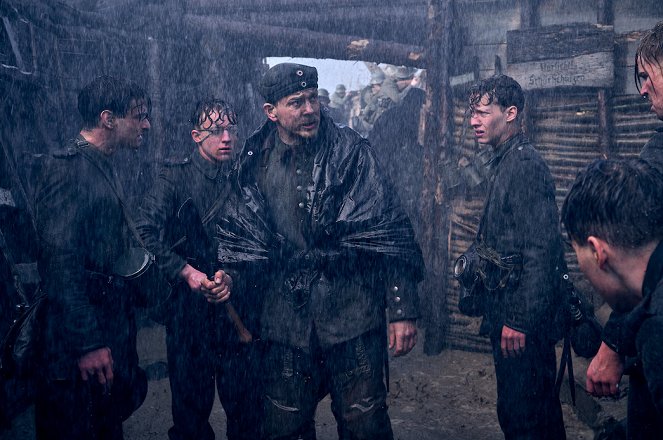Directed by:
Edward BergerCinematography:
James FriendComposer:
Volker BertelmannCast:
Felix Kammerer, Albrecht Schuch, Moritz Klaus, Aaron Hilmer, Adrian Grünewald, Edin Hasanović, Daniel Brühl, Devid Striesow, Sebastian Hülk, Andreas Döhler (more)VOD (1)
Plots(1)
All Quiet on the Western Front tells the gripping story of a young German soldier on the Western Front of World War I. Paul and his comrades experience first-hand how the initial euphoria of war turns into desperation and fear as they fight for their lives, and each other, in the trenches. The film from director Edward Berger is based on the world renowned bestseller of the same name by Erich Maria Remarque. (Netflix)
(more)Videos (4)
Reviews (13)
Clear winner of this year's war films, and for me better than 1917 and Dunkirk (Hacksaw Ridge is a little higher in my heart though). I haven't read the book, nor have I seen the original, I just know that it's an adaptation of a literary classic by Remarque and I think the film stood up to it on all counts. From the very beginning the film thrusts us into the action of the war itself, which I very much appreciate – thankfully there is no hour-long introduction to the characters before the war, everything happens on the fly and thanks to that the film also has a decent pace and never gets boring. Edward Berger has his craft down pat, technically it's a decent work, with epic music that adds to the atmosphere and tension. The characters didn't really grow on me, except for the main one, so emotionally it didn't hit me that much, although it is sad in places. I found it interesting to watch a war film from the perspective of the Germans, usually it's the other way around, so the film is definitely unusual in that way too. I enjoyed the scenes with the General screaming for himself (the final speech was great) and the armistice negotiations on the train were also interesting. There's not a lot of action scenes, though, there are only three epic battles, but since the film is set in a battlefield most of the time, I didn't mind. The highlight is the sequence in the middle where the tanks and flamethrowers come on the scene – you can feel the true despair and horror of war, really uncomfortable. As for the gore, there's not much of it either, but there are a couple of brutal shots (the tank running over probably sticks in the mind the most), so for me really big satisfaction and I would say it’s the best WW1 war film. Definitely an Oscar snatcher here and kudos to Netflix. 8.5/10.
()
The repetitive alternation of the heat of battle and the coldness of waiting, the recurring motifs for unimaginative half-wits, the book’s premise stripped of all its compelling scenes, which the film replaces with simple (and sometimes unrealistic) war porn and a completely hollow political storyline. The film fails to approximate Remarque’s insistent humanism except by literally illustrating the conflict of minor and major history, which doesn’t make a lot of sense (the horrors of the First World War didn’t actually consist in the fact that Foch wanted an armistice in six days and the Germans needed to think it over). As an adaptation, this is a disaster, devoid of psychology and with no thoroughly developed characters, and as a film it’s drawn out, transparent and superficial. The versions from 1930 and 1979 had something to them, but this fails even as a stand-alone work. Netflix’s problem isn’t the lack of casting actors of color. Its problem is that its projects lack dramaturgy and thus don’t much sense.
()
War is like a plague. It infects you with sadness, depression, and human devastation, and you can't escape it even when it ends. A two-and-a-half-hour film based on such a slim novel is quite intense. I quickly realized that the focus here is on the atmosphere of the trenches and the individual events unfolding on screen, which often lack logic or justification, more than on the story itself. In this film, the illogic of war and moments from the book, like the harrowing trench scene, speak for themselves. It captures everything happening in the trenches and during the signing of the war's end. It's a powerful, visceral experience — brutal, thought-provoking, and full of questions about human existence and self-destruction.
()
Harsh, powerful and depressing. But when I compare it with its genre counterparts, it comes out with only three stars. It's certainly more intense than Dunkirk, but not nearly as intense and action-packed as 1917, and it doesn't hold a candle to Hacksaw Ridge, for example. There's a drastic lack of introduction to the plot, some background to what where and when, as we know basically what's going on, but an historically ignorant viewer will get lost at times as to who exactly is signing the peace, and even a detail like that can steal some of the experience. While the war action is good, uncomfortable and authentic, there are only two sequences of it, which is simply not enough for a 150 minute film from the front. Qualitatively on a high level, not fully faithful to the source material, but I guess that's not a flaw. To my dissatisfaction, however, there are a lot of empty, long shots that add to the "artness" of the film, but detract from the pacing, to the point where I was looking at my watch at times. And the lack of more action didn't help either. I was expecting a bit more, but it's still probably a must-see film for a wide audience.
()
Erich Maria Remarque is one of my most beloved authors, one I come back to repeatedly throughout my life, and I have long postponed reading the first German adaptation of his most famous novel and the one most required in school curricula. There were many rumors about an inaccurate or even arrogant revision, so I am now shocked by how good the adaptation is. Not necessarily as the adaptation of a work, but rather as the comprehensive work of the filmmaker. It is precisely in the much criticized storyline of the negotiations over the end of the war that a few words or sentences are used to express the eternal pain that also appeared in books taking place long after the conflict or between the world wars. The minds and thoughts of the heroes mostly only harbor complaints about the unnecessary prolongation of the armistice, which results in the deaths of many innocents. For greater effect, such subjectivity is replaced with infuriating images and feelings of injustice. In the front lines, it is not about which scenes from the book were successfully transferred to the film (although the famous unbearable waiting in the trench with the enemy does not go lacking), but about the atmosphere of damnation, despair, and eternal damage that permeates every minute. I'm ultimately giving this the highest rating despite the omission of the storyline that troubled me the most in the book. In it, the main character returns home for a few days while on leave and realizes that the kind of return he imagined will probably never be possible. That people who have not experienced the battles will never understand the trauma and horror that a veteran carries. Within the condensation of the plot and the insistence on the destructive environment of contact with the enemy, I understand such a change and am happy to look past it. Because the literary work was created almost a hundred years before this film, and the warnings are no less relevant.
()



Ads